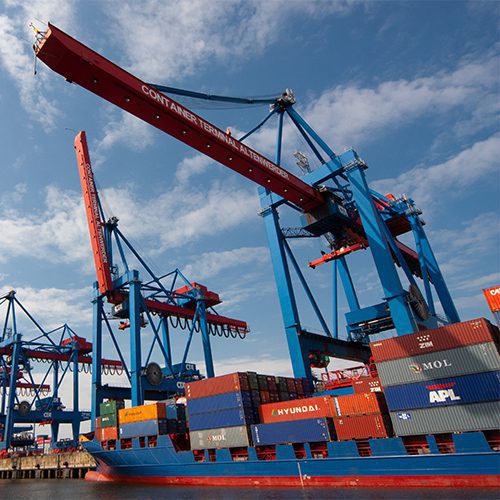On Dec. 23, 2021, President Biden signed into law legislation that will place additional restrictions on imports of goods made with forced labor from the Xinjian region in China.
Continue readingAudio Outdoorist: 2021 International Shipping Crisis
This is the second in our series about international trade and trade policy. In this episode, our director of government affairs Rich Harper and three members of our Trade Advisory Council, discuss the recent precipitous rise in shipping costs, which, on top of punitive tariffs, trade wars and the global pandemic, have made it difficult for our member companies to remain nimble and competitive. Recently, OIA sent a letter to the White House, calling on this administration to invite all stakeholders to the table to identify immediate solutions to the crisis and to enforce all existing regulations. In addition, we’re calling for support on legislation recently introduced in Congress to help alleviate the issues. To learn more about OIA’s advocacy work, to sign up for our trade alerts and to get involved in legislation to help outdoor companies address this crisis, reach out to Rich Harper, OIA Government Affairs Director.
White Paper: Outdoor Sports Insurance Highlights the Necessity of Network Security
For years, Network Security Insurance (commonly referred to as Cyber Liability Coverage) was widely regarded as a boutique coverage needed only by large corporations who store and process large volumes of consumer credit card information. In the later part of the last decade, however, this perception proved inaccurate when cyber-attacks on small to midsize businesses and retailers increased nearly 600%. Cyber extortion targeting small businesses now reigns supreme.
The good news is, Outdoor Sports Insurance has access to a wide array of insurance markets that write cyber policies specifically for the small business owner. These policies are both comprehensive in protection and breach response services, and affordable in premium.
Wrapped together with policies that cover the risks associated with hiking, camping, paddling or any outdoor activity, Outdoor Sports Insurance knows the market and has the products to fit any OIA member.
By definition, a “cyber attack”, or “security breach”, refers to unauthorized access to the IT infrastructure of a company by a third party (hacker) with the intent to corrupt, steal, or destroy data. The types of attacks hackers employ to achieve these ends runs a wide spectrum; Denial of Service (DoS), Phishing attacks, Password attacks and cross-site scripting attacks are just a few of the more common means by which hackers wreak havoc on a company’s network (and subsequently the daily operation of the business itself).
The most common attack, and by far the most damaging in terms of financial impact to victims, is the ransomware attack, commonly referred to as, “cyber extortion.” When a company has been hit with a ransomware attack, malicious software infiltrates a portion, or all, of the company’s IT mainframe. As malware increases in sophistication and complexity, so, too, do the extortion demands made upon the targeted companies. Between 2019 and 2020 alone, the number of companies that reported paying a ransomware extortion demand increased more than 300%.
According to a NetDiligence 2020 Cyber Claims study, the total cost of a network breach ranges anywhere from $1,000, to more than $120 million. The average cost to businesses with less than 200 employees is estimated to be $200K – $750K. Between 2018 and 2020, it is estimated that 45% of cyber-attacks targeted businesses with less than 200 employees. Less than 25% of those businesses carried the proper network security coverage, and even fewer had a formal incident response plan in place. Of the businesses impacted that did not carry the proper protection, more than 60% were out of business within 6 months.
Outdoor Sports Insurance works across multiple carriers to make sure all OIA businesses can find the right policy with the appropriate coverage at an affordable premium. In addition to the coverage itself, Outdoor Sports Insurance supplements the policies with risk management services and third party resources curated to ensure policy holders are equipped with the tools to mitigate the threat of an attack, and expedite the response time should an attack occur.
Included in the coverage portfolio, policy holders have access to a 24/7 cyber response hotline, educational tools to help network users identify threats and phishing campaigns, recommendations for protective software implementations, and best practices for user protocol of a business’s IT property and systems.
OIA has assembled best-in-class services provider partners to offer OIA special preferred pricing on goods and services in marketing, sales, sustainability, supply chain, finance, operations, research, rep associations, and trade shows. Outdoor Sports Insurance is one of those provider partners. Learn more about the OSI partner benefit for OIA members here. In order to receive the discounted pricing offered, you must mention and confirm your OIA membership to the service provider.
Rob Martin and Tori Hoeschler from Outdoor Sports Insurance recently sat down with Rick Saez from The Outdoor Biz Podcast to chat skiing, outdoor adventure, and risk management. Learn about how Outdoor Sports Insurance, protects businesses from inherent risks to areas of exposure that are less obvious, including how small and mid-sized businesses are increasingly becoming targets of cyberattacks. Also hear about how proper waivers and training can save a shop, and how Outdoor Sports Insurance can help you with all of it.
To learn more about cybersecurity offerings from Outdoor Sports Insurance, please contact the team at outdoorsportsins.com, or email OSI@horizonagency.com. And check out this Outdoor Biz podcast featuring Rob Martin and Tori Hoeschler from OSI
Audio Outdoorist: A Conversation with the Trade Advisory Council
Hear from OIA’s Director of Policy, Rich Harper, and members of the OIA Trade Advisory Council (OIATAC) as they discuss the council’s important policy role. In this conversation, Rich is joined by:
- Sara Bowersox, Sr. Manager, Global Trade Compliance, KEEN Footwear
- Ben Christensen, Vice President, Operations, Simms Fishing Products
- Jeff Tooze, Vice President, Global Customs & Trade, Columbia Sportswear
OIATAC reviews U.S. trade policy, relevant federal legislation and international trade negotiations, develops federal trade policy that may affect OIA membership and recommends policy positions to OIA government affairs staff and OIA leadership. It is made up of OIA members engaged in the business of manufacturing, marketing, and/or distributing outdoor recreation products. It includes representatives from small, medium and large entities representing all segments of the industry, including manufacturing, importers and retailers. OIATAC is administered and supported by OIA government affairs staff. Learn more about OIATAC here.
Subscribe to OIA’s Audio Outdoorist and listen to the full episode and other episodes anytime, anywhere. You can find the podcast on iTunes and SoundCloud
A Washington Town Hall on Trade for Outdoor Companies
When: Wednesday, May 5
OIA Director of Government Affairs Rich Harper will lead a discussion with OIA’s outside trade counsels, Ron Sorini and Andrew Samet, on the wide range of issues that impact global supply chains of critical importance to outdoor companies. Sorini, Samet & Associates has represented OIA for over 15 years, helping our membership navigate a myriad of issues, from punitive tariffs on products sourced from China to securing duty-free treatment for travel goods in the Generalized System of Preferences (GSP).
These are among the topics that Rich, Ron and Andrew will discuss:
- China tariffs: how long they might continue and prospects for a new exclusion process
- What the focus in Washington on forced labor means for the industry
- Implications of the Biden administration’s Build Back Better plan for the industry
- Shipping challenges for outdoor companies
- The prospects for new tariffs or free trade stemming from the Section 301 investigations with Vietnam
- The future of critical trade programs such as GSP and miscellaneous tariff bills (MTBs)
- Your questions





